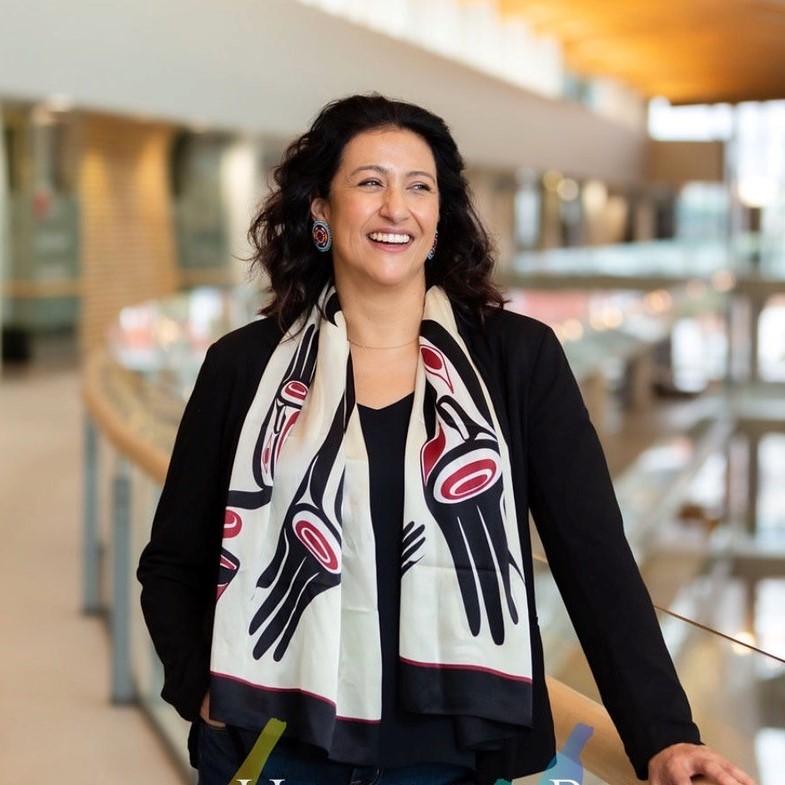Green College
October 12, 2023, 5:00 pm
Working from a place of cultural reclamation and trauma informed practice presents psychotherapists with a beautiful challenge and opportunity for knowledge exchange. Anishinaabe (Ojibway) peoples are regarded as grand medicine people due to our deep healing knowledge, which is embedded in our ancient practices of ceremony, medicine gathering, and language.
Aim: As a psychotherapy researcher and Anishinaabe, I was interested in accessing cultural concepts of helping and healing embedded in the linguistic structure and embodied communication in personal stories shared in an Anishinaabemowin (Ojibway language) healing intervention.
Methods: I co-created a method with 6 fluent Anishinaabemowin speakers to facilitate a healing intervention that they participated in as a group. Arranged in a circle around a kitchen table, two speakers sat across from one another and generated a counselling dyad where one person released her personal story to another who served as the counsellor in the presence of four other witnesses. After 45 minutes of empathic responding in Anishinaabemowin, the four therapeutic witnesses were invited to share their reflections with the group. It was within these interactions that I was able to articulate the therapeutic power of Anishinaabemowin group counselling and witnessing, and report on the emergence of a culturally agile group intervention. This intervention was video recorded to be viewed later, multiple times, in the presence of an Anishinaabemowin fluent elder who provided cultural oversight during the interpretive stages. This step ensured cultural and linguistic safety for participants and focussed my attention on participants’ embodied communication. Several listening stages preceded the eventual translation into English text. Trustworthiness checks were followed and transcripts returned to the participants. Analysis of the intervention was conducted dialogically in Anishinaabemowin during the reflecting circle portion of the group, and subsequently translated into English.
Results: Several healing concepts emerged in the counselling and circle work interactions and are considered unique features of Anishinaabemowin patterns and embodied cultural communication. Implications for cross-cultural group psychotherapy include: (a) identifying the linguistic limitations, challenges, and advantages of counselling in Indigenous languages, (b) expansion of current therapy models to principally include Indigenous language and culture in trauma informed practices.
Speaker Biography
I am an Anishinaabe psychologist and Indigenous language learner living in Syilx Territory, UBC Okanagan. I have been practicing psychotherapy for over 20 years, and received my training at the University of British Columbia Counselling Psychology program. I am happy to return to my alma mater and discuss my work in Anishinaabe language psychotherapy and share a case study in healing from family violence and colonial trauma. As a Canada Research Chair in Indigenous Health and Healing – Indigenous Approaches to Healing from Intergenerational Trauma and Loss, I am interested in producing knowledge at the intersections of ancient healing practices and cutting edge trauma-informed practice.
'Psychological Trauma and Resilience' is a cross departmental collaboration between UBC's Green College and Emeritus College.
Presentations in the Emeritus College Series at Green College Intergenerational Effects of Psychological Trauma (2021-22) revealed an interest, appetite and need for further conversations related to the development of resiliency among individuals and groups, and how they can cope more effectively and recover from the impact of various traumas. Building on this foundation, the six-part series Psychological Trauma and Resilience will embark on a journey to consider the many ways in which individuals and groups respond to trauma, possible approaches to coping with trauma and specific strategies for recovery.
Series Conveners: Marv Westwood, Counseling Psychology, with Judith Hall, Pediatrics and Medical Genetics; and Richard Vedan, Social Work
Event Dates: Oct 12, Nov 9, Jan 11, Feb 8, Mar 14, Apr 16
In-person with livestream option
Join us in-person at Green College on the UBC Vancouver Campus or virtually. The session will be followed by a reception.
